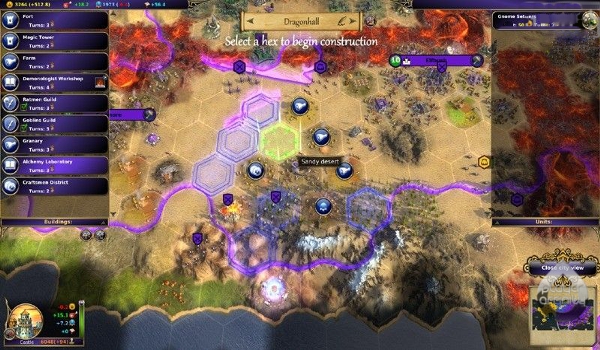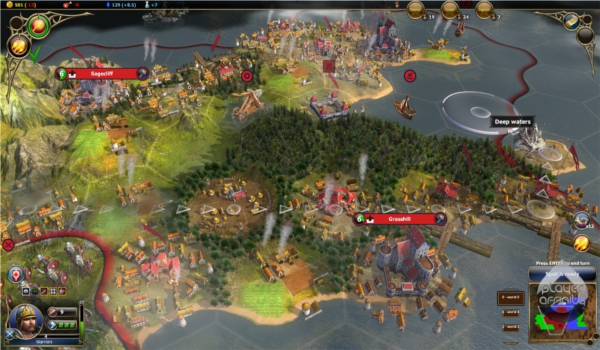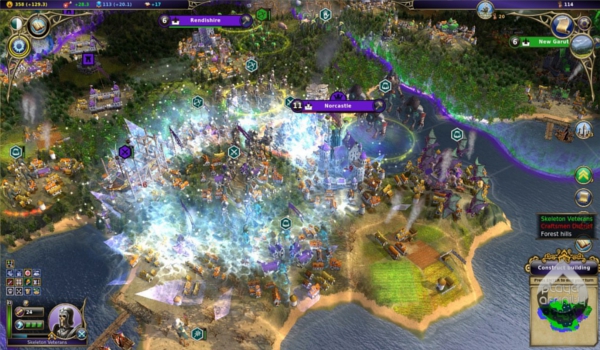In the crowded realm of strategy games where accessibility, strategic depth and balanced mechanics must merge in order to yield an enjoyable experience, Warlock: Master of the Arcane makes for an excellent example in this regard. In this colorful, turn-based strategy affair, you’ll get to build empires, amass large armies, venture off into uncharted territory, and call down a huge variety of spells on unsuspecting enemies and much more. Like any good turn-based game, Warlock keeps you playing late into the wee hours. Regardless of lacking some innovation and multiplayer options, Warlock: MotA is a terrific and mercilessly addictive game.
From the very start Warlock features a colorful presentation with a goofy vibe and tone. The game is very bright-lit and the environments range from dusty, barren wastelands where kobolds and rats roam about to green and well-populated forests and beyond. The mentality of Warlock also has some quirky humor in it as well, I couldn’t help but to chuckle when I unlocked the ability to use the “Order of The Stubborn Knights”, who live up to their goofy name by shouting snide remarks whenever you order them around. Animations look great and the soundscape is dominated by ambient sounds and a nicely orchestrated soundtrack that sets the right mood. A small piece of advice though, go into the settings menu and mute the advisor altogether. The narrating advisor’s voice is so painfully grating and poorly crafted that you’re much better off reading all the tips you’re given.
However, even if you only have the faintest understanding of strategy games, the game’s top-notch interface does an outstanding job of teaching you the ropes. After a couple of minutes I immediately understood how the core mechanics worked and what I was supposed to do. Warlock closely follows the footprints of its larger counterparts like Civilization V. You click the New Game option, pick your desired war mage, preferred landscape, and then you’re ushered into the game’s world with that painful advisor’s voice providing guidelines along the way.

It’s easy to summon units and order them around the hex-based grids and the game always highlights important battle information. Navigating a battle scenario is made particularly easy by a blue button in the bottom-right corner of the screen which immediately takes you to a point of interest. For example, if the blue button reads “Enemy at the gate”, you’ll instantly warp to the city that’s in danger of being assaulted by the enemy where you can then deal with the matter at hand. There is no automation features though, so expect to micro-manage all of your units one-by-one. At times micro-management can become a bit of a pain if you want to focus on the big picture and spend your time expanding cities and researching new technology, for instance.
Warlock does a terrific job of keeping you hooked in the game at all times. This is due mostly to gods in the game whose relationship can be nurtured by accepting and completing quests and defeating enemies who belong to rival gods. Fulfilling these tasks grants you more money, unique spells and units and other benefits. Although, as a trade-off, you’ll be punished if you fail the objective in the allotted turn-limit. These missions range from founding new cities and defeating pesky monsters to researching a new type of structure. This really changes up the experience and motivates you to take a break from the cycle of building structures, training units, exploring and killing enemies and conquering the enemy with brute force, which usually becomes a bit of a repetitive affair in most other turn-based titles, but not so-much here.

There’s also the combat which is tactical, accessible, and highly enjoyable. The level of success you achieve in each encounter is governed by where your units are positioned, from what flank you’re attacking and what the type of damage resistance your unit is imbued with. Before attacking, you’re given a number that dictates the outcome of each encounter and if the outcome doesn’t look good, you can try a different tactic to see if a differing strategy might swing the odds in your favor.
Although some of these combat systems have been seen before in other strategy games, there is one element that spices things up quite a bit – spells. As the battle mage you have a wide repertoire of spells to utilize in combat. Although you start out with a very small selection of spells, you’ll soon research new spells and eventually unlock the ability to heal units, call down a firestorm, and summon imps to assist in tricky situations and many other arcane masteries. Interacting with these spells really encourages the player to do more than just click on an enemy and watch a flashy animation play out. Instead, you’ll be forced to carefully plan what spells are best suited for the situation at hand and how you want to use your precious pool of mana, which slowly regenerates every turn. Spell variety and their usage is an exciting element that truly gives the combat a strategic edge.

On the other hand, if you’re a seasoned turn-based veteran and have played games like Rise of Nations and Civilization for many years, then you’ll likely get a slight feeling of déjà-vu from playing Warlock. While the game does offer a few novel twists on the formula with the quest systems and the addition of spells, the core gameplay itself is very similar to its forebears. If you’ve grown tired to the genre, then Warlock isn’t going to outright convince you to start investing late nights into the turn-based strategy genre once again.
It’s really unfortunate then that Warlock features no multiplayer options to speak off whatsoever, which is a huge downer seeing how utterly competitive and engrossing the gameplay really is. While it’s tough to craft a decent multiplayer system for turn-based games where a match can span many, many hours, I would have still loved to see an opportunity to face off against other human opponents from around the globe.
Warlock: Master of the Arcane is a great turn-based strategy game – it provides hours of gleeful turn-based action for a budget price of 20 dollars. While the core gist of the experience isn’t vastly different when compared to its gargantuan retail counterparts, the game still throws-in enough touches to keep you engaged for many hours on end, even if those hours are strictly spent playing by yourself. If you have a knack for turn-based strategy games, then you will want to try Warlock: Master of the Arcane.